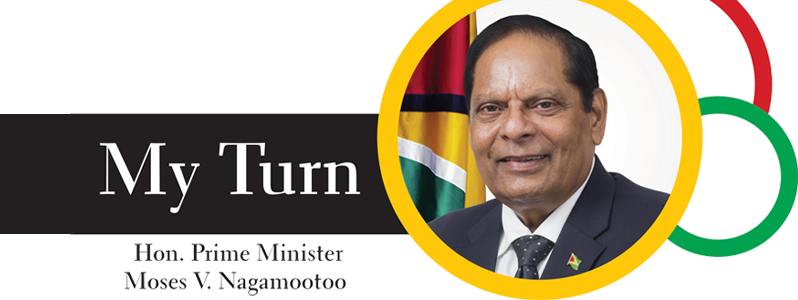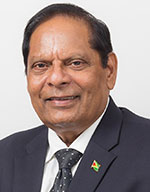TODAY is the last lap in the 2018 local government race. Every voter wants to be a winner. So, every vote must count; every voter must decide whether he or she would cast the ballot tomorrow for a better village or town, or to get victory for his or her party. Will it be an X for the better candidate, the poor village; or for party victory?
Judged from the campaign rhetoric in Berbice, it seemed that the opposition leader has placed party before village. He boasted that at the 2016 elections, the PPP won 15 out of the 19 local government councils; his party also controls the Regional Democratic Council. The question that he did not answer is, how better off are the villages and the region under his party’s control?
 The PPP tries to extend this control into ownership of certain villages, one of which is my birthplace, which is in the Whim-Bloomfield Neighbourhood Democratic Council (NDC). That emboldened his side-kick Zulfikar, a PPP Member of Parliament, to shout at me, “you can’t go back to Whim!”
The PPP tries to extend this control into ownership of certain villages, one of which is my birthplace, which is in the Whim-Bloomfield Neighbourhood Democratic Council (NDC). That emboldened his side-kick Zulfikar, a PPP Member of Parliament, to shout at me, “you can’t go back to Whim!”
Well, I will. Today.
I will join a March from Bloomfield and, afterwards, I will take part in a mini-rally in the Whim Middle Walk Street. I will walk the familiar, once muddy dam of my childhood years, from Tara Shop to Anguya’s Turn, and even beyond Bamsingh’s Corner! And, again, I will remember Pa’s words: “Thoroughbreds don’t cry…”
STRAIGHT CONTEST
For these elections tomorrow, there is a straight contest in this NDC between the PPP and the Alliance For Change (AFC), the latter putting up candidates in all seven constituencies, for the first time. The PPP has tried all types of tricks and terror tactics to scare away the young AFC candidates. They ripped their posters from posts in Whim and threatened them. In Zulfikar’s village, Bloomfield, an attempt was made to set fire to the house of a vibrant, young and combative female AFC candidate, who considers herself to be “fit and proper” to be a councillor.
In that area, the opposition hysteria is not about the villages, and the condition of life of the villagers. It is over party control of the villages. It is all about the party’s victory, not the victory of the villages.
RACIAL CLEAVAGES
“Party victory” in these villages has become a cover for ethnic, racial support. Ethnic mobilisation for partisan causes has become, sadly, part and parcel of Guyana’s contemporary political history. This is true for both sides of the ethnic divide, except for relatively brief spells during the Rodney Revolt and the short-lived campaigns of the Patriotic Coalition for Democracy (PCD). The APNU+AFC coalition government has since symbolised multi-ethnic politics, but it has not broken the back of racial cleavages in the society. It could, over time; and the broadening of the base of ethnic cooperation.
We have many lessons from which we could learn from our history, about the failure to make a dent in ethnic/political control. During the 1964 elections a popular and charismatic Indo-Guyanese, Balramsingh Rai, a self-styled “Rajput”, tried to poach in the PPP’s (then Jaganite) territory. His party was decimated. Ravi Dev, an Indian activist, spearheaded a movement to woo sugar workers away from their PPP-controlled union. He failed. Another Indo-Guyanese, Seilo Baichan, previously tried and failed, and his Agricultural and Allied Workers Union (AAWU) was sent into oblivion.
In Whim, Dr. Veerasammy Ramayya (Edgar), a one-time pro-Hindu, ROAR backer, formed a group, styled, People Helping People (PHP) to oust the PPP from the Whim village council. He won two seats, then he faded. He roamed and wandered for a while, then joined the AFC. He was disillusioned that the AFC was forming a coalition with “the PNC”, but stayed for a while before he fizzled into a bag of disaffection and disgruntlement. Totally dejected, he has returned to worship at the ethnic altar of the PPP.
POLITICAL BUTTERFLY
Then the hitherto obscure and unheard of Dr. Leslie Ramsammy, returned from America for the 1992 elections. He vowed to destroy Dr. Cheddi Jagan and his communist PPP. A native of Albion, he childishly thought that he could win support in Berbice away from Dr. Jagan. He too was decimated. Some reports stated sarcastically that even his campaign manager did not vote for his United Republican Party, or some such obscure name at that time. He too roamed here and there and, like a political butterfly, he eventually landed in the PPP – but only after the death of Cheddi Jagan.
The phony scholars would not understand this malignant nature of the Guyanese political reality, and the bleak blemish that ethnic cleavages have cast on our politics. They should examine how inverse racism works, and how it could be used to infect even inner ethnic cohesion.
This is what is unfolding in the tiny fishing village, Whim.
VILLAGES BEFORE PARTIES
I had hoped that the ethnic disease would not contaminate grassroots, community representation; that people would vote to improve their conditions in the villages and small towns. I had seen local government politics as a reservoir from which the nation could draw fresh energy. Local councils could then become the training ground for new leaders, which would be the surest guarantee that our democracy will live, thrive, grow and develop.
Local democracy should be about our villages, not about our parties. Voters should look at all the candidates and select those who best represent their interests.
Tomorrow, voters could restore hope that they can run their own affairs. They must vote for quality leadership; for candidates who either have the time or would find the time, to bring changes to the villages.
Tomorrow is not about party or ethnic victory. I would like to see people voting for village victory. They must vote for candidates they have assessed to be capable, honest and hard-working. They should throw away the old hats.
Above all, I hope that people will vote for better roads, streets, cleaner drains and regular waste disposal; street lights and improved dams to cultivation areas. They should vote for better markets, community centres, playfields, schools, health centres and clean burial grounds.
Tomorrow, at the grassroots, reason and not race, should prevail.




.png)









